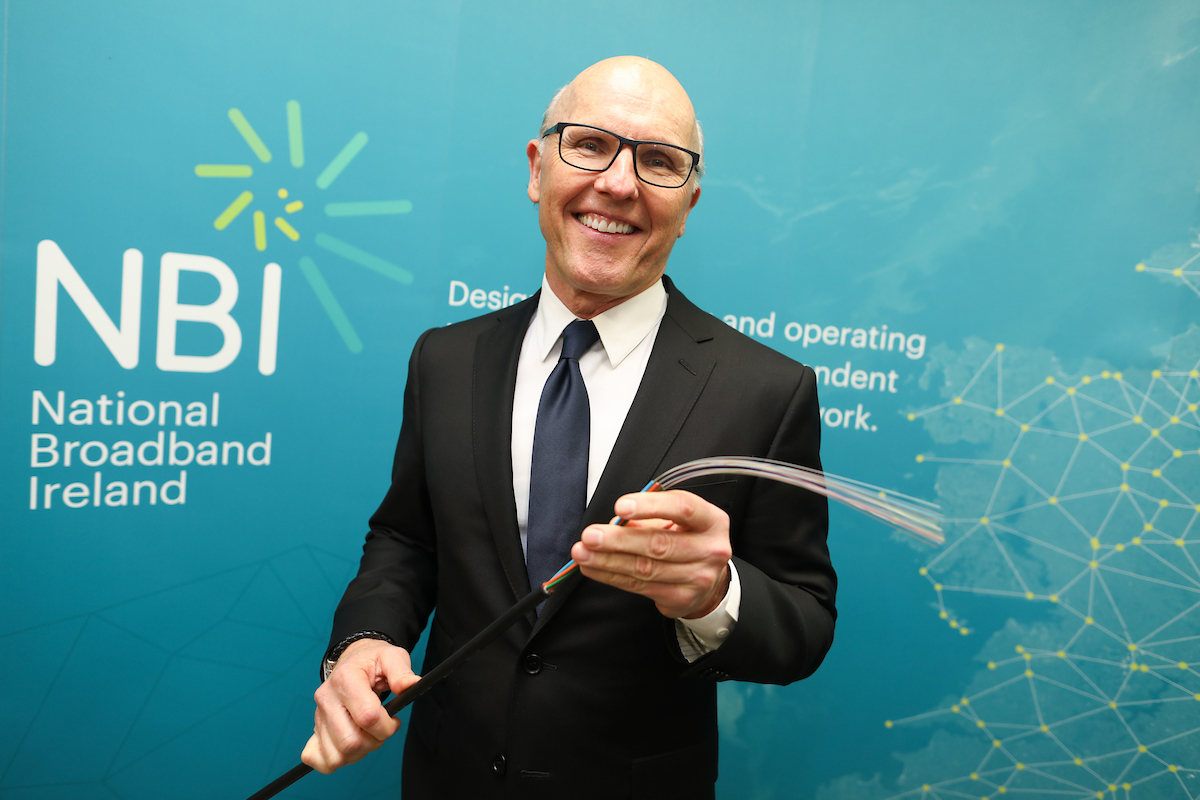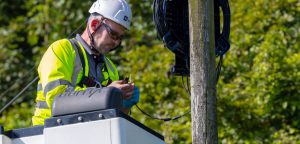Source: Capacity Magazine
The Irish Republic is aiming to connect 100% of its rural population to fibre broadband, and telecoms entrepreneur David McCourt is the person in charge of the project.
Once complete, the Irish National Broadband Plan (NBP) will enable 1.1 million people to find education and jobs in their rural homes, rather than continue the drift to Ireland’s cities or emigrate from the republic entirely.
“The Irish government has set out to rejuvenate rural Ireland. Like so many countries, its rural areas are underserved,” says McCourt.
Ireland’s not alone, he adds. “Three million people a week globally move to urban environments. That means every three weeks you get a new London, another New York or a new Hong Kong.”
This is “unsustainable for the environment and for housing”, he says, “and this drift devastates rural parts of the world”. It has other consequences: country dwellers in all parts of the world are hugely unhappy with the idea that they’ve been abandoned. That has its own political consequences.”
It’s a theme that McCourt has taken up before. In his book, Total Rethink, published in 2018, he wrote that “in 2016 the total of displaced people [across the world] was 65 million, mostly by war but also by national disasters and economic circumstances”.
McCourt is a serial telecoms entrepreneur, ever since in 1982 he created McCourt Cable Systems, which became the largest privately-owned designer and builder of cable systems in the US. Since then he’s headed businesses that have invested in TV stations and built or run phone networks and cable TV networks on both sides of the Atlantic.
Move into Ireland
His big move into Ireland came in 2013 when his investment firm Granahan McCourt acquired Enet, which manages the nationwide metropolitan area networks (MANs) on behalf of the Irish government, as well as a majority shareholding in AirSpeed Telecom, an enterprise communications provider in Ireland.
Six years later Granahan McCourt signed contracts with the Irish government for the €5 billion project to bring high-speed broadband to every premises in rural Ireland that is underserved by commercial operators.
National Broadband Ireland (NBI), of which McCourt is chairman, will be a wholesale-only operation, providing connectivity to all retail operators across the country, at first through a series of 300 broadband connection points (BCPs).
NBI has already hired contractors to survey over 22,000 premises in the counties of Cork, Galway, Limerick and Cavan. “We recently began work in Kerry and Wexford,” says NBI. “Last month surveying started in Roscommon, Monaghan and Mullingar. This month NBI surveyors will be in Tipperary and Carlow — that’s 11 of out 26 counties in five months.”
McCourt says: “Giving them high-speed connectivity doesn’t solve all problems, but you can’t solve their problems without it. We can then look at Ireland as a test case for the rest of the world.”
Every man, woman and child In Ireland, “it’s all been done without any political nonsense”, he smiles on a video call from California. “They accomplished what they set out to do. We’ll deliver fibre-to-the-home (FTTH) to every man, woman and child in Ireland.”
McCourt — maybe there’s a clue in the name — is of Irish parentage. His mother was born in County Galway, on the west coast; his father is from County Tyrone, in the north. The NBI’s remit, of course, is limited to the 26 counties of the Republic. The six counties of Northern Ireland are part of the UK, where separate companies operate.
When the plan was first proposed “there were a lot of objections to the process”, he tells me, “but the government stayed the course. This is a project that takes collaboration between government and the private sector — which for generations
were how big problems were solved.” The Department of Communications in Dublin identified more than 530,000 premises as not being served with adequate broadband services. As a result, the NBI has “agreed an ambitious plan to provide service to these premises, including a target of reaching approximately 115,000 premises across all 26 counties in year two of the roll-out.”
The BCPs will be in the vanguard, rural centres that will be fitted out for remote working, educational and other purposes.
“They’re unlike an internet café of the 1990s. These connection points will be a place for connectivity and a place for collaboration and the sharing of ideas.”
His vision is that these will enable an Irish version of Silicon Valley, where companies “all started in someone’s garage”. In Silicon Valley, everyone talks about ideas. “The BCPs will be for ideas — how to transform Ireland. Young men and women in Ireland — and in the UK and America — will come up with the next generation of ideas that will transform their communities.”
The project is huge: the Republic has a total population of nearly five million across more than 70,000 sq km — so NBI is aiming to connect more than 20% of the population, and they are spread across 96% of the land mass.
Incidentally, 180 years ago the population of the whole island was eight million; today the Republic and Northern Ireland together have fewer than seven million, making the island of Ireland one of the only places in the world whose population has fallen in two centuries — rural Ireland remains desperately depopulated.
“This programme is the biggest for Ireland since rural electrification,” says McCourt. That took three decades from 1946 to connect the 99% of the population who lived in a million homes.
McCourt has had to bring the project to maturity during the Coronavirus tragedy, and that has only served to increase the need for rural broadband. Across the urban, developed world people have successfully worked at home since February. Not, though in poorly served rural areas.
With broadband, a company in Dublin — or New York or London — can get access to “a very well qualified man or woman 100 miles away”, says McCourt.
“What happens to a very, very qualified woman in rural Ireland who wants to be at home near her kids or parents? Or what happens to a single mum or dad? There are a million reasons why someone would want to be in a rural part of the world.”
Devastated communities
Rural communities in Ireland “have been devastated”, he says, as “grocers, butchers, bakers, clothes shops, restaurants, hair salons, churches and pubs have closed. We need to find a solution to that problem, giving equal access and global opportunities to rural areas. Connectivity is part of the solution.”
The challenge extends far beyond Ireland, he adds, pointing to declining coalmining areas such as West Virginia in the US. “Traditional jobs have been on a steady decline over 100 years as people have been left over from the industrial revolution.”
McCourt is clearly proud of his achievement in starting NBI. “It’s been a labour of love over three years, and we’ve put tens of millions of dollars at risk.”
How long will it all take? “We’re working on a plan to speed up the build, and build it in 60% of the time we first planned.”
NBI’s customers will be the retail telecoms companies across the Republic of Ireland — mainly Comcast’s Sky, Liberty Global’s Virgin Media and UK-based Vodafone. What about Eir, the incumbent? Later, a representative of NBI updates me: “I can confirm NBI is engaged with Eir and it is anticipated that they will join … the NBI network.”
McCourt says: “We’ll charge the same price to everyone. And there’ll be 1Gbps from day one. I remember when we offered 1Mbps in New York in the 1990s and everyone was saying in the boardroom that was maybe too much.”
For much of his career, McCourt has run companies that have built — rather than operated — communications networks, including in the UK, in the early days of cable TV, in places such as Cambridge and Croydon. “I even built a network in Dublin and I bought it back three years ago: the blueprint still said McCourt.”
Where next, if NBI shows that rural fibre can be a success. “We have plenty of appetite. We have a team that looks at this every day.” But Ireland “is the most interesting project in Europe.”



